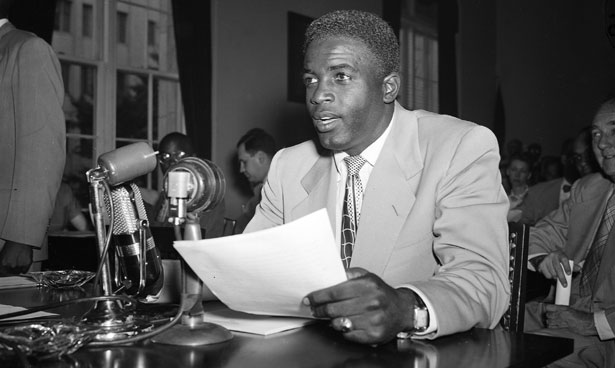(Jackie Robinson, the subject of the movie 42, testified before the House Un-American Activities Committee in 1949).
I am not a person who romanticizes Jim Crow. Separate but equal was never equal, and activists were right to upend that system of apartheid. But everything comes at a price and the price Jackie Robinson paid, at the expense of blacks specifically and the liberal movement in general, was too high of a price to pay.
For those who don’t know, Jackie Robinson testified against black activist and artist Paul Robeson before the House Un-American Activities Committee, backed Richard Nixon against John F. Kennedy, backed the Vietnam War, and even questioned the patriotism of Dr. Martin Luther King when he announced his opposition to the war.
| Everything comes at a price and the price Jackie Robinson paid, at the expense of blacks specifically and the liberal movement in general, was too high of a price to pay. |
This is who Jackie Robinson was. For him, it was the white man’s way or no way.
For some, celebrating Jackie Robinson’s integration into baseball boils down to the idea that blacks needed to be liked by even the most racist whites in order to have any real shot at the American dream. So to them, it was acceptable for Robinson to do whatever it took, even if it meant going so far as to unleash the Congressional hounds on Robeson, as long as it ensured that the doors to white baseball were opened to Robinson.
I don’t buy into the notion that black people must be redeemed in the eyes of whites in order to progress, mostly because it places far too much power in the hands of racist whites and leaves blacks in a tenuous position, both psychologically and economically.
Saddest of all though is the idea that many black folk who went to see 42 will not only view Jackie Robinson’s integration as a grand success, without ever bothering to consider the human consequence, but that they will undoubtedly view the movie’s box office success as some sort of win. How is that possible? How is it possible to consider the movie’s box office success a win for anyone except those who benefit from the movie’s revenue? Simple: Since there is no real black movement or black leadership in this country, black people latch onto whatever symbolism they can as a way of giving themselves an emotional victory, even if it’s largely a product of their own imagination.
Right now on my Facebook page some of my black friends are celebrating Jay-Z’s trip to Cuba, as if it has any relevance to their lives. As if Jay-Z isn’t the same man who tried to take advantage of Occupy Wall Street, the only group to even attempt to take on income inequality in this country, by selling Occupy-themed T-shirts without giving the group a percentage of the revenue. In the minds of many black folk, it’s perfectly fine to show indifference to working-class values as long as you are a member of the black 1 percent. You too can be a vulture capitalist because as long as you don’t take any lip from conservatives like Marco Rubio, blacks will rally around you no matter what.
If we’ve learned only one thing from the Obama Era, it should be how to discern sentiment from concreteness, emotion from passion, and symbolism from substance. Judging from the success of 42 at box office, we’re just not there yet. We didn’t learn the lesson when Robinson integrated or when Obama was elevated to the highest office in the land without ever addressing the needs of the working poor. In 20 years or so, I’m sure we’ll be afforded another opportunity to either show up or get shut out. The cycle continues.
Yvette Carnell is a former Capitol Hill and campaign staffer turned writer. She is currently an editor and contributor to Yourblackworld. You can reach Yvette via Twitter @YvetteDC or on Facebook.
The article originally appeared in Your Black World.



0 Comments